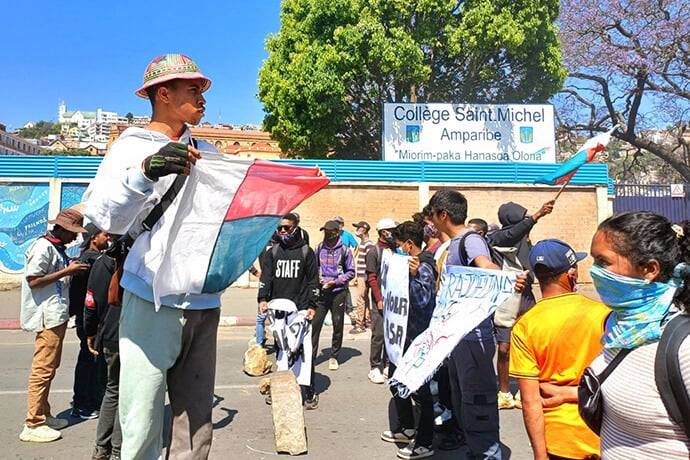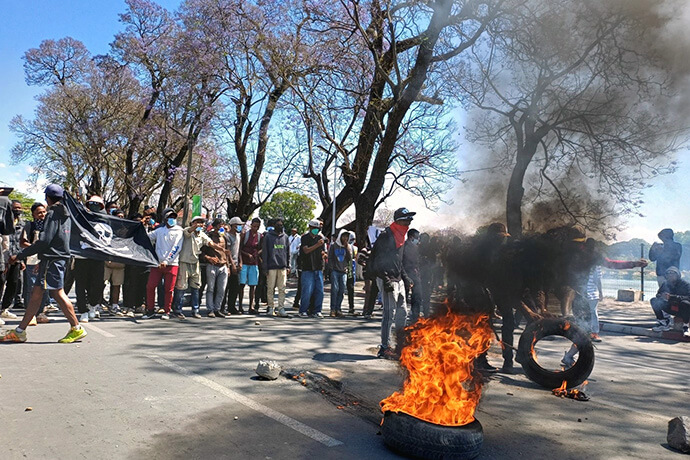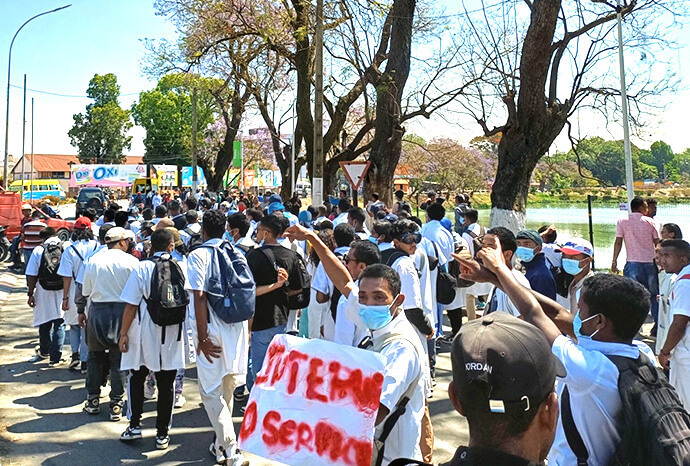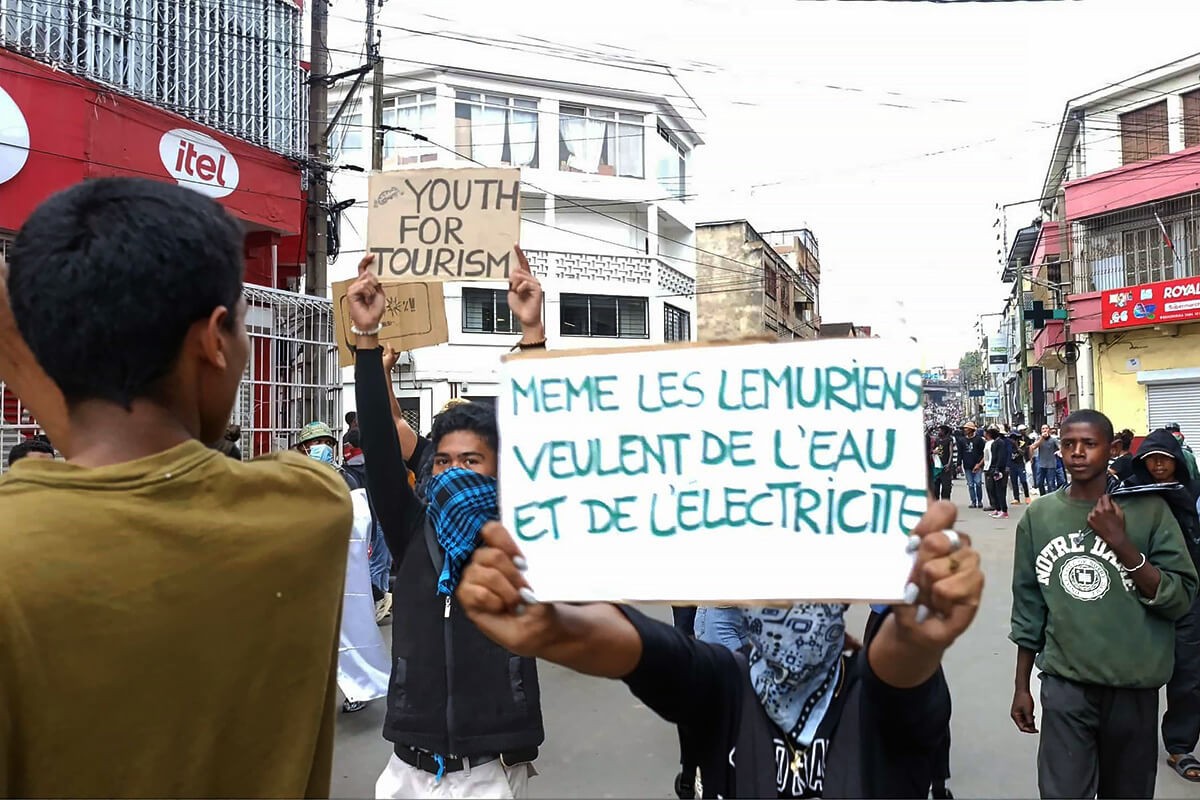Key points:
- Protests led by Madagascar’s Generation Z have erupted nationwide over water shortages, power cuts and worsening poverty.
- United Methodist Bishop João Sambo has called all congregations in the episcopal area to pray for peace and national reconciliation.
- The United Methodist Church in Madagascar, through local congregations like Ambodifasika, is responding with prayer and acts of compassion amid the crisis.
The United Methodist Church is calling for prayer and compassion amid the political and social upheaval in Madagascar.
Since Sept. 25, massive demonstrations, led mainly by Generation Z, have shaken the capital and major cities across the country. What began as outrage over constant power and water outages has evolved into a nationwide movement denouncing corruption, poverty and social injustice.
President Andry Rajoelina fled the country over the weekend after members of an elite military unit joined the protest. On Oct. 13, Parliament announced that it had impeached the president, and military leaders said they had taken power and that a new civilian government would be formed. On Oct. 17, Col. Michael Randrianirina was sworn in as Madagascar’s president six days after launching a military coup.
The United Methodist Church has called for prayer, solidarity and faithful action. Bishop João Sambo, whose episcopal area includes Madagascar, Mozambique, South Africa and Eswatini, issued a letter urging all United Methodists to lift the people of Madagascar before God.

Methodists’ Wesleyan heritage calls for combining personal piety with social holiness, and becoming agents of transformation amid suffering, the bishop said. He quoted Matthew 5:9: “Blessed are the peacemakers, for they will be called children of God.”
Sambo encouraged congregations to embody the principles of faith and justice that define Methodist witness:
- To care for the poor, widows, and orphans, as urged in James 1:27, making the church a refuge for those most affected by instability.
- To intercede for national leaders, following 1 Timothy 2:1-2, praying for peace, wisdom and reconciliation.
“May your congregations be havens of hope and provision for those most affected by instability,” the bishop said. “May your actions reflect the love of Christ, promoting justice, reconciliation and peace.”
In response to the bishop’s call, The United Methodist Church in Madagascar is mobilizing prayer gatherings and community support efforts.
At Ambodifasika United Methodist Church, the United Methodist missionary in Madagascar, the Rev. Eric Kalumba Nkulu, expressed the church’s deep concern and compassion for the people.
“We found that the situation here is not good,” Kalumba said. “We are going through bad times, especially that there is a loss of human lives, there is a loss of property, houses and everything. … The Methodist Church in Madagascar did not find it good to be silent.
“We thought of praying in favor of the whole country,” he said, “because this situation is not only in the capital. It is everywhere, in different regions of the country. … This is why we can pray with a prayer in favor of Madagascar. ... This is our contribution, our participation, in this moment of trial.”
Across the nation, United Methodist believers are gathering in small groups to intercede for peace and for families affected by the unrest, showing that faith can still be a light in times of darkness.

Despite its abundant natural wealth, Madagascar remains one of the poorest countries in the world. Citing the World Bank, the Associated Press reported that the country of 31 million has a poverty rate of about 75 percent.
Public infrastructure, already fragile, has failed to keep pace with population growth. In parts of Antananarivo, residents have lived without running water for more than six months, while power cuts regularly last over eight hours a day. In poor neighborhoods of the capital, people queue as early as 2 a.m., yellow jerrycans in hand, hoping to collect a few liters of water.
Protesters carried signs with a desperate message: “Give us water — we smell!”
JIRAMA, the state-owned Water and Electricity Company, blames the blockage on aging infrastructure, falling dam levels and the impact of climate change. But for much of the population, those explanations no longer hold.

The movement began when two city council members, Clémence Raharinirina and Baba Rakotoarisoa, called for a peaceful march to protest the blackouts. The gathering point was Ambohijatovo Garden, also known as Democracy Square, a historic and symbolic site of political expression in Madagascar.
On Sept. 25, thousands of young people — students, workers and unemployed — flooded the streets of Antananarivo. However, the demonstration, deemed unauthorized by the authorities, was violently dispersed by security forces. Tear gas and warning shots turned the protest into chaos.
“We’re only expressing our frustration, and they respond with tear gas. We’re asking for water and electricity — these are basic human rights,” said a young woman who joined the protest in Antananarivo.
According to early reports from the United Nations, at least 22 people lost their lives — a figure the government disputes.
Subscribe to our
e-newsletter
Known as “Gen Z”, this generation born between 1997 and 2012 has become the voice of a weary nation.
“We don’t live anymore — we survive. No water, no power, health care is unaffordable, and after university, unemployment is waiting for us,” explained Mialy Rakotozafy, a student in Antananarivo.
“It’s unbelievable that in 2025, in a public university, we still have to pay to use the restroom,” added Mirana Rakotoarisoa, another protester.
The Sept. 25 Gen Z protest was followed by arson attacks targeting the homes of several political figures — including three homes belonging to two deputies and a senator linked to the ruling party — as well as looting in several major stores across the capital.
According to local media, losses in the Analamanga region are estimated at more than $38 million, with nearly 1,900 jobs now at risk.
Members of the Gen Z movement denied any involvement in the acts of vandalism and insisted they are using peaceful methods of protest. The movement has spread to all six provincial capitals, uniting young people, parents and workers in a common demand for the right to live with dignity.
Rakotoarivony is a communicator for the Madagascar mission field of The United Methodist Church.
News media contact: Julie Dwyer, news editor, [email protected] or 615-742-5469. To read more United Methodist news subscribe to the free UM News Digests.




